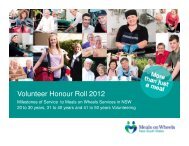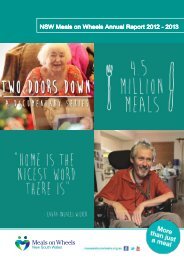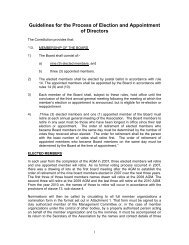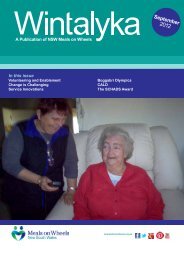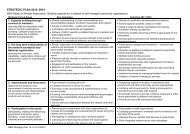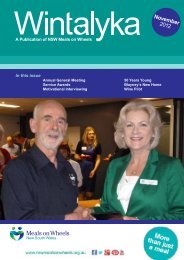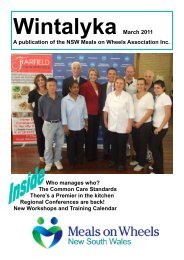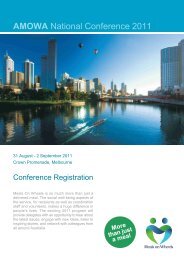Issue
Wintalyka August 2011 - Meals on Wheels
Wintalyka August 2011 - Meals on Wheels
Create successful ePaper yourself
Turn your PDF publications into a flip-book with our unique Google optimized e-Paper software.
Wintalyka <strong>Issue</strong> 01 / 2011<br />
<strong>Issue</strong> HCC 01 / 2011 FF Training Wintalyka Day<br />
If the client is seeking culturally specific foods,<br />
are the raw ingredients available in the area<br />
and is there a volunteer or staff member who<br />
may assist with cooking in the home? Is there<br />
a source of centre based meals which may be<br />
accessed?<br />
Clients need to be encouraged<br />
to determine their own food<br />
goals. These may be varied and<br />
may or may not be achievable<br />
by your service. The goals need<br />
to be achievable, either short<br />
or long term, and add to the<br />
wellbeing of the client.<br />
Once goals have been determined a care plan<br />
can be made, which may include other service<br />
types. Flexible Food is a time specific program<br />
with a view to integrating the client back into<br />
the community whilst removing support as<br />
appropriate and once the client has developed<br />
or regained a social network.<br />
The research into the effects of social isolation<br />
on deteriorating mental and physical health and<br />
the ameliorating effects of social inclusiveness<br />
through programs such as Flexible Food is well<br />
documented e.g. Promoting social networks<br />
for older people in community aged care –<br />
Research to Practice Briefing, 2 February 2009<br />
Benevolent Society).<br />
Hunter Access Point Assessment Team<br />
We were very pleased to have Dorothy Shipley<br />
and Kylee Davis from the Hunter Access Point<br />
Assessor Team join us in the training session.<br />
This was an opportunity to discuss aspects of<br />
the assessment and referral process. It also<br />
allowed for the Access team to have a sound<br />
understanding of the Flexible Food Pilot and<br />
which clients would benefit from a referral.<br />
A Narrative Approach to Flexible Food<br />
Assessment<br />
Viv Read from Emerging Options Pty Ltd<br />
introduced the group to a narrative approach<br />
to assessing for care planning and goal setting.<br />
Knowledge is imparted more effectively through<br />
listening to story rather than reading reports.<br />
A person centred approach needs the client<br />
to be able to tell their story in the form of a<br />
dialogue that will address complex issues<br />
beginning with a big picture of what the client<br />
wishes to share about their life that gradually<br />
focuses into goal setting<br />
28<br />
The assessment takes place in the client’s home,<br />
providing context and a better understanding<br />
of what is important to the client. Photos,<br />
mementos, knitting and other home content<br />
will also help to give context to the clients life<br />
and provide clues for what is important in their<br />
lives.<br />
Areas of life including friends, family, mobility,<br />
shopping, nutrition, independence, hobbies and<br />
other areas are the triggers to the questions and<br />
prompts that need to be crafted by the Flexible<br />
Food staff. Prompts need to allow for space for<br />
the client to give a meaningful response about<br />
what they want. For example the difference<br />
between “What do you eat”? And, “remember<br />
the last really good meal you had – what did you<br />
enjoy about it – what was exciting about it?”<br />
See what emerges through conversation and<br />
story and work with that. Begin by designing<br />
open ended questions that begin with enough<br />
space to prompt life experiences rather than<br />
assume that you know what will be good for the<br />
client. In setting goals a prompt could include:<br />
“Think about a year’s time – what stories would<br />
you like to be able to tell friends about how you<br />
are living that you can’t say now”<br />
After two or three stories, themes and patterns<br />
will start emerging that will be indicators for<br />
what goals the client may wish to pursue. If a<br />
client doesn’t know what they want, the patterns<br />
in their story may help them to be clearer on<br />
changes they would like to make.<br />
It is important to gradually focus to a goal<br />
setting care plan and be ready to change<br />
direction in your dialogue if necessary so that<br />
you stay with strengths, interests capacities<br />
and opportunities that will support goal setting<br />
based on nutrition and social activities.<br />
Prompts for questions in the person’s home<br />
could include for example photos. Begin with: “I<br />
see you have lots of photos – who is that person<br />
in the photo?” “Where does she live?” This can<br />
gradually be focused down to “Do you see them<br />
often or as much as you would like?” Or: “Are<br />
you a Morisset born and bred person?” “How<br />
did get here?” or “What made you choose to<br />
come here?”<br />
Exploration needs to become specific and not<br />
a continuous open ended chat. “What did you<br />
used to do that you can’t enjoy now – but with<br />
support would be able to do again?”<br />
“You mentioned earlier that you enjoyed<br />
cooking. Can you tell me how well you manage<br />
this now? How often do you cook?”<br />
www.nswmealsonwheels.org.au



